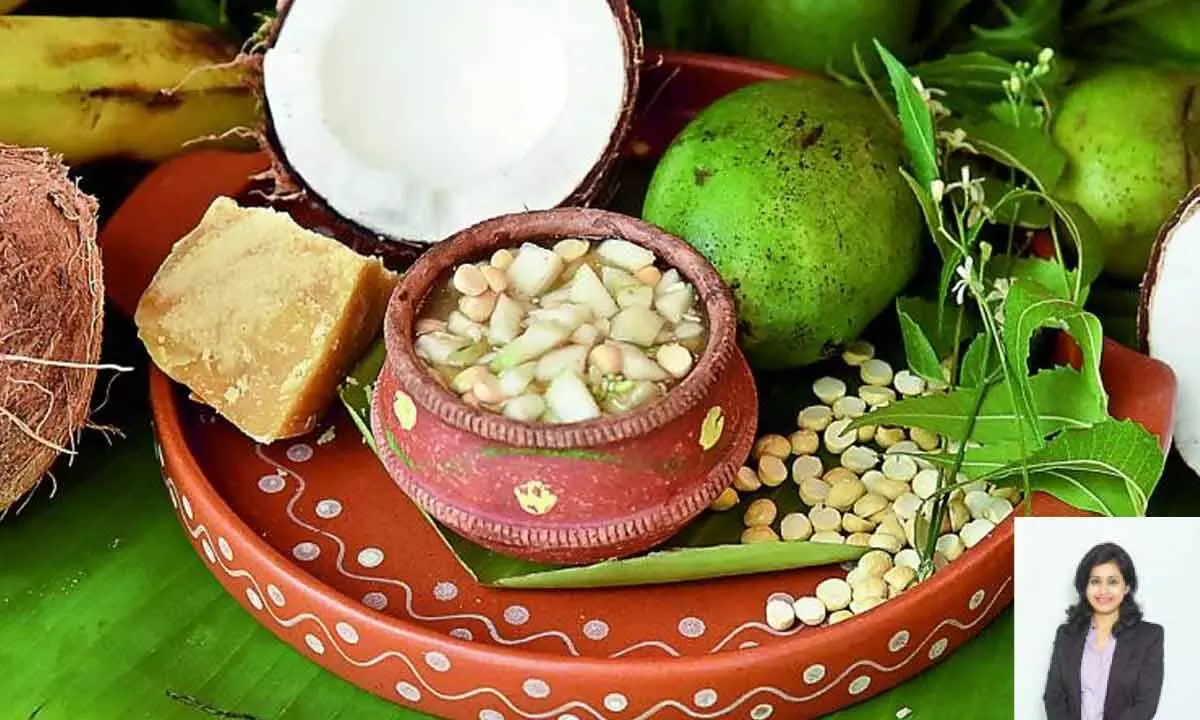Ugadi Pachadi and its health benefits

UGudi Padwa/Ugadi is the festival that marks New Year's Day for several states, including Karnataka, Andhra Pradesh, Telangana and Maharashtra. This year, the festival will be celebrated on 22nd April. It is prepared on this day and offered to God seeking blessings for the year ahead.Pachadi is prepared by adding jaggery, salt, cut pieces of raw mangoes, neem flowers in Karnataka. In Andhra they add tamarind juice to soak all these ingredients. This preparation recipe differs from place to place.
Significance of the Pachadi
The dish is a mixture of different tastes like sweet, salt, pungent and bitter. Sweet taste comes from Jaggery which symbolizes happiness, salt symbolizes fear. Pungent taste from the raw mangoes symbolizes surprises in life and bitterness from the neem flowers represents the sadness of life. In addition, some places add tamarind also to add sour taste which represents unpleasantness. Basically, it shows a mixture of everything in life. Each ingredient has many nutritional benefits.
Jaggery
Jaggery is an excellent source of iron for a plant product. A single serving may contain nearly ten percent of your required iron intake for the day. Iron is critical for supporting healthy blood cells. Getting enough iron in the diet prevents anemia, tiredness and improves muscular function. It also has different minerals and vitamins like choline, betaine, Vitamin B12, B6, folate, calcium, iron, phosphorus, magnesium, selenium, and manganese. Compared to other sweeteners, jaggery is a good source of antioxidants. The molasses left in jaggery contains phenolic acids that help reduce oxidative stress on the body. Antioxidants in general are linked to a lower risk of certain forms of cancer, reduced signs of aging, and lower risk of dementia and macular degeneration. As a result, switching from white or brown sugar to jaggery may help reduce the risk of developing these conditions.
Raw mangoes
Raw mango is rich in various vitamins and minerals. The richness of essential B vitamin niacin and fiber in raw mango promotes the health of the heart. It helps in lowering cholesterol levels, improves blood circulation and prevents the risk of cardiovascular diseases. The goodness of vitamin C essential nutrients triggers the immune system, improves vision, makes your skin and hair healthy and lowers the risk of prostate cancer. Having it also shields the body from various infections like common cold, cough etc.
Also, raw mango contains less calories and sugar which helps to trigger metabolism & keep satiated and burn extra fats, as in weight loss. It also helps in digestion, detoxification and acts as antioxidants.
Neem Flower
In Ayurveda, neem is a well-known herb that is the key player in different traditional remedies. Neem flowers are also used in the treatment of belching, nausea, anorexia, and intestinal worms. Neem flowers are an amazing natural antiseptic that can help in cleansing your system in one of the healthiest ways possible. These flowers are white-yellowish in color and are completely safe for consumption. It is available in dried and powdered form in the offseason, but it is best to consume it fresh. It is also safe for diabetics with a low glycemic index.
Tamarind
Tamarind is rich in fiber and has no fat content. Studies suggest that eating tamarind daily might actually help in weight reduction since it contains flavonoids and polyphenols.
The polyphenolic compounds found in tamarind can prevent Peptic Ulcers. The seeds extracts have anti-inflammatory effects which stabilize blood sugars and reverse the damage of pancreatic tissue which affects people suffering from diabetes. The enzyme present in tamarind alpha amylase is also proven to reduce blood sugar level.
Salt
Salt has many benefits in the body, including increasing body water conservation and making you less thirsty. It also helps to manage metabolism in a positive way. Salt intake should be 5-6gm/day for a healthy individual rather than taking it in more quantity which is present in the package & processed foods. To conclude we can say 'A happy and healthy Ugadi/Padwa to all.'
(The author is Chief Nutritionist, Aster RV Hospital)








